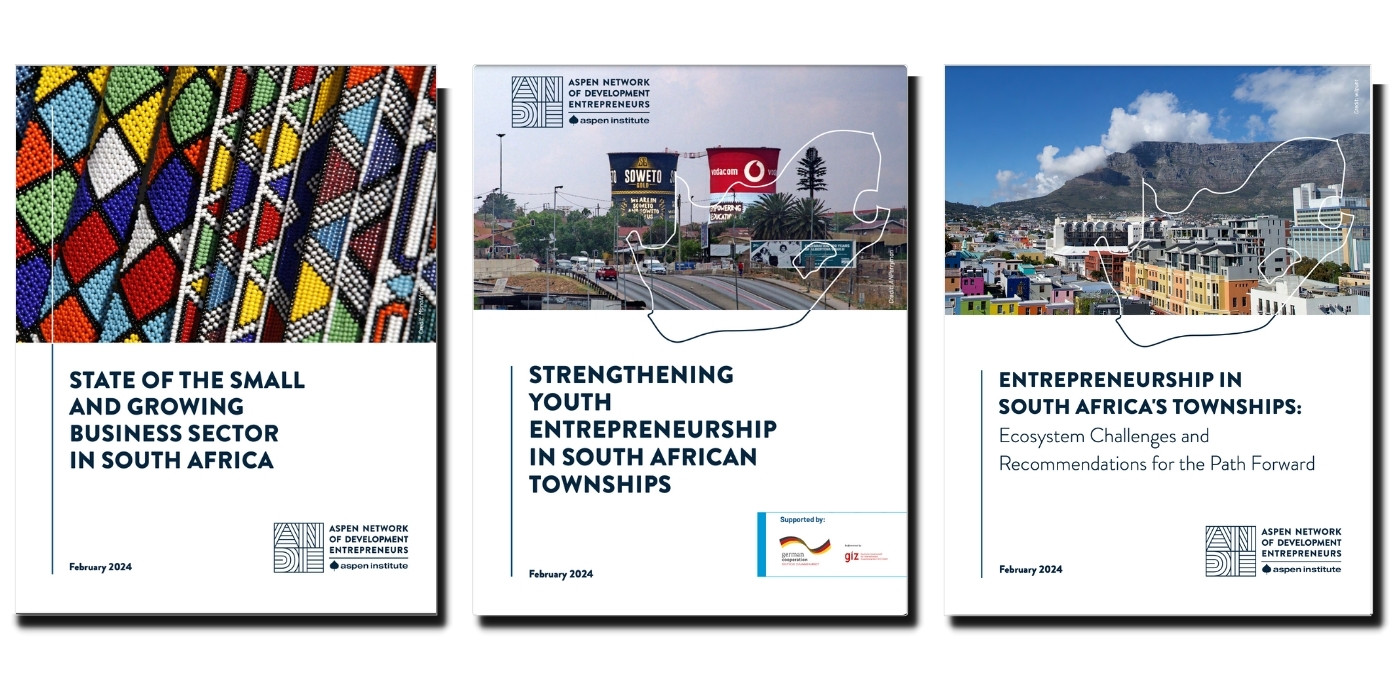ANDE’s recent reports reveal the challenges facing South African entrepreneurs – and highlight the potential of targeted policies to ignite growth.
Despite encouraging signs of growth, South Africa faces complex economic hurdles—stubbornly high unemployment rates (around 30%) fuel social unrest.
Amidst this, policymakers see entrepreneurship as a crucial solution, an outlook substantiated by an overwhelming number of South Africans who choose it to make a living.
However, business closures in South Africa are on the rise, and many entrepreneurs anticipate creating fewer jobs. Moreover, early-stage entrepreneurial activity in South Africa decreased to levels lower than those seen pre-pandemic.
In light of such opportunities and challenges, ANDE released three research reports examining available entrepreneurial support, challenges, and opportunities, focusing on small and growing businesses (SGBs), township entrepreneurs, and township youth entrepreneurs.

The study also reveals South Africa’s increasing commitment to entrepreneurs from disadvantaged backgrounds. Over 150 organizations now support township entrepreneurship. However, there us room for improvement on how they address the intersection of social minority status and entrepreneurial challenges.
Assessing the State of the Small and Growing Businesses in South Africa
ANDE’s new State of the SGB Sector in South Africa report provides snapshots of the entrepreneurial support available to SGBs in the economy by examining funding opportunities, capacity development programs, and the impact focus of entrepreneur support organizations (ESOs).
The data-rich study shows many funding and capacity development programs in the entrepreneurial ecosystem, with 197 active funding sources, most of which provide capacity development support programs in tandem.
Nevertheless, the challenges lie with available funding and capacity development programs often not adequately addressing the diverse needs of early-stage entrepreneurs.
The study also reveals South Africa’s increasing commitment to entrepreneurs from disadvantaged backgrounds. Notably, over 150 organizations now support township entrepreneurship, and initiatives like women-focused WOMHUB and the FNB Youth Start-up Accelerator are gaining momentum. However, researchers emphasize the need to address the intersection of social minority status (including factors like race, gender, and age) and entrepreneurial challenges.
Understanding South African Township Entrepreneur
 Townships in South Africa are historically disadvantaged areas on the outskirts of towns and cities, designed to enforce racial segregation during the apartheid era (1948 – early 1990s). While desegregated since 1994, negative perceptions about townships persist.
Townships in South Africa are historically disadvantaged areas on the outskirts of towns and cities, designed to enforce racial segregation during the apartheid era (1948 – early 1990s). While desegregated since 1994, negative perceptions about townships persist.
ANDE’s new township report, informed by the vivid voices of entrepreneurs and ESOs, classifies the numerous challenges township entrepreneurs face into four categories: macroeconomic conditions, entrepreneur resources and abilities, funding availability, and business development service (BDS) provision.
During an interview with researchers, an entrepreneur shared their experience of facing unrealistic requirements to become eligible for funding. They initially attempted to obtain seed money through a National Youth Development Agency grant. However, the agency was unfamiliar with their business model and declined their application. Despite this setback, the entrepreneur persevered and launched their store a year later.
They gave me an Entrepreneur of the Year award! And 9 years later, I’m trying to get a government loan. I have my financials audited, a business plan, a pitch deck, and financial modeling, but they’re still creating this barrier. So you should ask yourself, who is this fund designed for?”
Despite challenges, successful township entrepreneurs emerge. The report features such success cases and makes actionable recommendations to investors, BDS providers, and the government to foster township entrepreneurial ecosystems that will enable more success cases to emerge.
Zooming in on Township Youth Entrepreneurs
 Both youth entrepreneurs and township entrepreneurs have been touted as solutions to the rampant unemployment problem in South Africa. Youth represent 60% of the total unemployed, and townships in the economy present an estimated market value of ZAR 900 billion.
Both youth entrepreneurs and township entrepreneurs have been touted as solutions to the rampant unemployment problem in South Africa. Youth represent 60% of the total unemployed, and townships in the economy present an estimated market value of ZAR 900 billion.
ANDE’s newly released report on township youth report is the first endeavor in the sector to explore how the intersectional identity of township youth entrepreneurs shapes both the challenges and opportunities they encounter in entrepreneurship.
The report uncovers that the challenges faced by township youth entrepreneurs are mainly akin to those encountered by older township entrepreneurs. However, youth entrepreneurs may experience additional obstacles, as they are more frequently targeted by crime and may lack the training and business skills typically associated with more life experience.
In this context, the report underscores the significance of tackling the proximity issue between township youth entrepreneurs and ESOs. Isolation adversely affects entrepreneurs by restricting their access to information and quality support, which is essential to overcoming existing obstacles.
The Way Forward
South African leaders see entrepreneurship as key to tackling unemployment. These reports provide vital insights for policymakers and organizations seeking to create a more nurturing environment for SGBs, township businesses, and township youth entrepreneurs.
The funding data for the state of the SGB sector report is available to ANDE members via this link. Non-ANDE members can request it by contacting SangEun Kim at SangEun.Kim @ aspeninstitute.org.
This research was possible thanks to the generous support of the Walmart Foundation and Deutsche Gesellschaft für Internationale Zusammenarbeit (GIZ) GmbH.

Since its founding in 2009, the Aspen Network of Development Entrepreneurs (ANDE) has tracked the state of the small and growing business (SGB) sector globally through its bi-annual State of the Sector reports. One of the most dynamic markets for small business growth is South Africa. The South African entrepreneurial ecosystem requires innovative solutions to increase the available finance, improve access to markets, reduce bureaucratic burdens, and strengthen the capacity of small businesses and start-ups. This report examines the state of the SGB sector in South Africa as of 2023 by assessing the amount and type of financial support available to enterprises, the type of capacity development offered, and trends in the policy landscape that affect the entrepreneurial ecosystem. The report concludes by highlighting the activity of ANDE and its member

South Africa faces significant economic challenges, with youth disproportionately affected by high unemployment rates and limited economic participation. Townships, home to a significant portion of the unemployed population, are now focal points for addressing youth entrepreneurship as a solution. However, sparse data on township youth entrepreneurial activity hinders effective support strategies. This research indicates that proximity issues, such as isolation and lack of access to information, are key barriers for both youth entrepreneurs and business development support providers. Current support efforts often lack relevance and fail to target high-growth potential businesses. To improve outcomes, there's a need to shift focus towards reaching more youth entrepreneurs and tailoring interventions to their needs.

South African politicians frequently refer to entrepreneurship as a potential solution to the economy’s significant unemployment problem. In reality, many entrepreneurs need to come from townships. Numerous reports address challenges faced by South African entrepreneurs. What distinguishes this report from extant studies is that this report features the voices of entrepreneurs and entrepreneur support organisations (ESO) to vividly portray township entrepreneurs’ challenges through in-depth interviews. This report also aims to elucidate the factors that contributed to the success of exemplary township entrepreneurs despite existing challenges and other strategies that ESOs can employ to guide more entrepreneurs to emulate these success stories.












